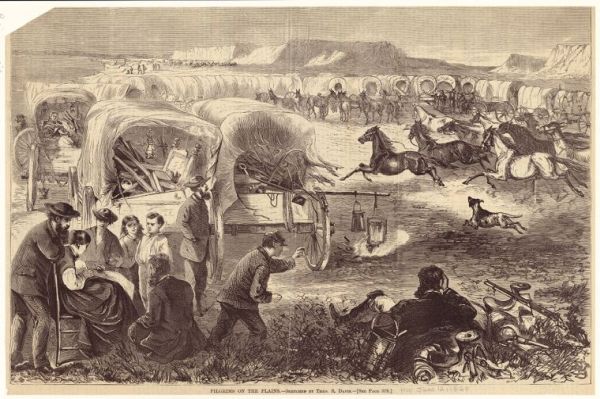Excerpts from the Diary of Eliza Ann McAuley (1852)
May 11: Got up early and took the wagons down a little nearer the ferry, so as to take advantage of the first opportunity to cross. A dreadful accident happened here today. A boat manned by green hands was taking a boat of cattle across. The cattle rushed to one end of the boat, causing it to tip, and in a moment there was a mass of struggling men and animals in the water. One man was drowned. Another, who was a good swimmer, remembering that he had left his whip, coolly turned around and swam back for it.
May 19: This day we crossed the Missouri River and traveled three miles to the west. All got over safe, and then cast our last look at the states we have left behind, probably forever. We have now entered upon a long and tedious journey for about 2,000 miles, where, excepting the emigrants, we expect to see but little to cheer us up, but calculate to endure many hardships and privations until we reach the land of our destination. The country on this side of the Missouri is beautiful in appearance, and I think possessed of a rich soil. But timber, I judge, to be scarce. We formed a company this evening, consisting of nine wagons and 35 persons, including men, women, and children. We encamped on the bank of a small lake which extends south from the Missouri River. Had good camping, plenty grass, wood and water. Caught some fish in the lake this evening.
Excerpts from the Diary of Rev. John McAllister (1852)
October 23: The country is mostly open and descending to the valley, about four miles. No very bad places in descending. Here you strike settlements of Oregon. It is but a short distance to the Columbia River to the left, but the valley gradually widens, the mountain disappearing. About two miles to the mouth of the Sandy River. On the other side of here we left our stock and went alone to the ferry of the Columbia, which is just above an island. It commenced raining about 8 or 9 o'clock, and continued the rest of the day. After crossing the river, we found our folks. Camped on a sandbar.
October 24: Sunday. Promising fair weather. Left here in the evening. Rained 1/4 of the day.
October [?]: Reached Oregon City. The country between the Sandy River and Oregon City is mostly covered with dense fir forests.
Excerpts from the Diary of Amelia Stewart Knight (1853)
Thursday, April 14th: Quite cold. Little ewes crying with cold feet. Sixteen wagons all getting ready to cross the creek. Hurrah and bustle to get breakfast over. Feed the cattle. Hurrah boys, all ready, we will be the first to cross the creek this morning. Gee up Tip and Tyler, and away we go, the sun just rising. Evening — We have traveled 24 miles today and are about to camp in a large prairie without wood. Cold and chilly; east wind. The men have pitched the tent and are hunting something to make a fire to get supper. I have the sick headache and must leave to boys to get it themselves the best they can.
Saturday, April 23rd: Still in camp, it rained hard all night, and blew a hurricane almost. All the tents were blown down, and some wagons capsized. Evening — It has been raining hard all day; everything is wet and muddy. One of the oxen missing; the boys have been hunting him all day. Dreary times, wet and muddy, and crowded in the tent, cold and wet and uncomfortable in the wagon. No place for the poor children. I have been busy cooking, roasting coffee, etc., today, and have come into the wagon to write this and make our bed.
Friday, April 29th: Cool and pleasant; saw the first Indians today. Lucy and Almira afraid and run into the wagon to hide. Done some washing and sewing.
Monday, May 2nd: Pleasant evening; have been cooking, and packing things away for an early start in the morning. Threw away several jars, some wooden buckets, and all our pickles. Too unhandy to carry. Indians came to our camp every day, begging money and something to eat. Children are getting used to them.

